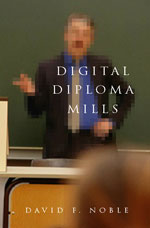Digital Diploma Mills
The Automation of Higher Education

Paperback, 128 pages
ISBN:
1-58367-092-0
Released: March 2003
Is the Internet the springboard which will take universities into a
new age, or a threat to their existence? Will dotcom degrees create new
opportunities for those previously excluded, or lead them into a digital
dead-end? From UCLA to Columbia, digital technologies have brought
about rapid and sweeping changes in the life of the university—changes
which will have momentous effects in the decade ahead.
In the first book-length analysis of the meaning of the Internet for
the future of higher education, David Noble cuts through the rhetorical
claims that these developments will bring benefits for all. His analysis
shows how university teachers are losing control over what they teach,
how they teach and for what purpose. It shows how erosion of their
intellectual property rights makes academic employment ever less secure.
The academic workforce is reconfigured as administrators claim
ownership of the course-designs and teaching materials developed by
faculty, and try to lower labor costs in the marketing and delivery of
courses.
Rather than new opportunities for students the online university
represents new opportunities for investors to profit while shifting the
burden of paying for education from the public purse to the individual
consumer—who increasingly has to work long hours at poorly-paid jobs in
order to afford the privilege. And this transformation of higher
education is often brought about through secretive agreements between
corporations and universities—including many which rely on public
funding.
Noble locates recent developments within a longer-term historical
perspective, drawing out parallels between Internet education and the
correspondence course movement of the early decades of the 20th century.
This timely work by the foremost commentator of the social meaning of
digital education is essential reading for all who are concerned with
the future of the academic enterprise.
David Noble spells out the meaning of the automation of higher
education in terms of academic freedom, civic values, and the
distortions of research, curriculum and tuition on campus. Noble knows
more than anyone about the growing struggle by faculty and students in
North America against these erosions.
Digital Diploma Mills is a
wake-up call to millions of teachers, students, and parents about the
battle over an underpublicized but big assault on quality education and
intellectual freedom.
—Ralph Nader
David Noble’s critique of technology has never been more forceful—or
more usable for faculty—than in his writing on distance education. This
collection of his ideas is a succinct and brilliantly pointed antidote
to cyber hype. Most of all, its force derives from a passionate
attachment to the notion of education as a vital human compact between
individual, in-the-flesh students and teachers.
—Mary Burgan, General Secretary, American Association of University Professors
Digital Diploma Mills is essential reading for faculty union
activists and others struggling to understand and combat the increasing
corporatization of our universities. David Noble outlines the dismal
future toward which higher education seems to be headed, but even more
important, he eloquently reminds us of our obligation to forestall that
future and to preserve the promise that genuine education entails.
—Susan Meisenhelder, President, California Faculty Association
David Noble has done it again.
Digital Diploma Mills
provides a penetrating analysis of how the marriage between new
technologies and the corporate search for profits shapes what happens in
the classrooms of higher learning. This is essential reading not only
for those who care about the pursuit of truth in an autonomous academy,
but for all who are concerned with the growing corporate encroachments
in virtually every sphere of our existence.
—William E. Scheuerman, President, United University Professions
David Noble’s insightful book sounds a sobering warning. If digital
education becomes just another fast-food commodity, students and
teachers will lose, while higher education becomes further entrenched in
corporate big business.
Digital Diploma Mills should be required reading for educators and others interested in the brave new world of online education.
—Nicholas Baran, author and former technical editor, BYTE Magazine

your aim is to improve its student’s capability to manage it involves developing their judgment about situations and about people. It also implies helping them improve their personal skills.
ReplyDeleteDistance Learning in India
Distance Learning MBA in India
MSc Distance Education